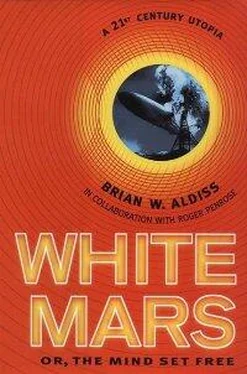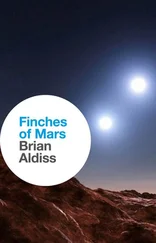Brian Aldiss - White Mars
Здесь есть возможность читать онлайн «Brian Aldiss - White Mars» весь текст электронной книги совершенно бесплатно (целиком полную версию без сокращений). В некоторых случаях можно слушать аудио, скачать через торрент в формате fb2 и присутствует краткое содержание. Год выпуска: 1999, ISBN: 1999, Издательство: Little, Brown UK, Жанр: Фантастика и фэнтези, на английском языке. Описание произведения, (предисловие) а так же отзывы посетителей доступны на портале библиотеки ЛибКат.
- Название:White Mars
- Автор:
- Издательство:Little, Brown UK
- Жанр:
- Год:1999
- ISBN:0-316-85243-0
- Рейтинг книги:5 / 5. Голосов: 1
-
Избранное:Добавить в избранное
- Отзывы:
-
Ваша оценка:
- 100
- 1
- 2
- 3
- 4
- 5
White Mars: краткое содержание, описание и аннотация
Предлагаем к чтению аннотацию, описание, краткое содержание или предисловие (зависит от того, что написал сам автор книги «White Mars»). Если вы не нашли необходимую информацию о книге — напишите в комментариях, мы постараемся отыскать её.
White Mars — читать онлайн бесплатно полную книгу (весь текст) целиком
Ниже представлен текст книги, разбитый по страницам. Система сохранения места последней прочитанной страницы, позволяет с удобством читать онлайн бесплатно книгу «White Mars», без необходимости каждый раз заново искать на чём Вы остановились. Поставьте закладку, и сможете в любой момент перейти на страницу, на которой закончили чтение.
Интервал:
Закладка:
Willa-Vera announced they would soon decode the signals they had recorded: Chimborazo’s “voice” fluctuated up and down the electromagnetic spectrum, and might be comprehended more as music than actual speech. They would have everything interpreted in a year or possibly two.
Their well-publicised conviction was that, after many centuries of meditation, this towering mentality—a mentality dwarfing Everest—had become a virtual god in wisdom. Once its mode of communication was understood, Chimborazo’s immaterialism and transcendent qualities would set humankind upon a fresher and more vital path than could at present be visualised.
We would then move forward into “an ultimate reality”.
I would certainly welcome a reality beyond my present day-to-day life…
It was six years and 100 Martian days since the economic collapse that had swept EUPACUS away, carrying the terrestrial infrastructure with it. A manned ship arrived within Mars matrix and went into orbit about the planet. The visitor appeared enormous, resembling, some said, St.
Paul’s Cathedral turned upside-down. We marvelled at it as if we were peasants.
Another age had dawned in the history of matrixflight. This strange object proved to be a ship powered by nuclear fusion. The epoch of wasteful chemical rockets was dead.
“What—what kind of rocket is that, for God’s sake?” exclaimed a young YEA.
It was John Homer Bateson who replied, and even he sounded impressed, “I would suggest that rockets are now as obsolete as the bathysphere.”
“What in hell is a bathysphere?” was the response.
A ferry floated down from this new marvel. Witnesses remarked that in the gentleness of its descent it was like a giant metal leaf. Our isolation was now ended…
Much jubilation broke out in the domes. Of a sudden, the prospect of green meadows, golden beaches and blue oceans became almost overwhelmingly desirable. We looked eagerly to see the faces of our rescuers from Downstairs.
Three unsmiling men confronted us. Marching into the domes, they announced that the Premier of the UK had taken over the assets of the failed EUPACUS consortium. They were the legal inheritors of all EUPACUS property. A EUPACUS ship had been stolen five years previously; its pilot, one Abel Feneloni, together with his accomplices on the ship, had been arrested. The ship was badly damaged when crash-landing in the north of Canada.
In his defence, continued the newcomers, Feneloni had claimed he was sent in the stolen ship under direct orders from the so-called government of Mars. A considerable stack of dollars was therefore owed by Mars to the government of the UK. Until this outstanding bill was paid, no free flights back to Earth were going to be allowed.
So we were quickly given the opportunity to relearn the value of money, and that some people lived by it.
Tom stepped forward. “We do not use money here.”
“Then you do not use our ship.”
The three terrestrials were invited to a consultation meeting. They refused, saying there was no necessity for consultation. All they required was settlement of an unpaid debt. They were clumsy in their spacesuits and we easily overpowered them.
To our disgust we found they wore guns under their suits. These were the first guns ever seen on Mars, our White Mars. We imprisoned them, took over their ship and signalled the UN on Earth.
We stressed that guns were not permitted on Mars; their importation therefore constituted an illegal act. Nor did we accept responsibility for the actions of Abel Feneloni; we regarded him as an outlaw. The UK had no entitlement to try and extract monies from us for Feneloni’s crimes.
To ameliorate this confrontational tone, we declared that we possessed a discovery beyond price that, as Utopians, we were prepared to share with everyone.
Clearly, much had changed on Earth during our absence. The United Koreas had become a great power, but were at odds with the UN—and with the rest of the planet. The response we received was favourable to us. The matter of the stolen ship remained to be resolved. Meanwhile our three captives had to be convinced that they were in the wrong and released, pending trial; and as many people as wished to return to Earth were immediately to embark on the waiting ship. They would be welcome Downstairs.
It was done. Many of our people crowded aboard the great orbiting ship—in particular, those who had children.
I wept when saying farewell to my friends.
I cannot tell here the histories of those who returned Downstairs. Some adjusted to the hectic heavy-gravity globe. Some became happy and settled. Some struggled in a world grown unfamiliar—and, of those, some prospered while others sank into failure.
Sharon Singh and Hal Kissorian parted company. Perhaps their involvement with each other had been too intense to endure. Kissorian became a great utopianist, and held a responsible position in government in Greater Scandinavia. Sharon Singh emigrated to Mercury and joined the FAD rebels in the Fighters Against Dictatorship struggle for Mercurian Utopia.
The fact remains that when our Martians stepped out from the rescue ship into the dazzling draughty light of their mother planet, they were greeted like heroes. Receptions were held for them in many of the world’s great cities. Several of them found themselves to be famous, their faces well known, even their speeches memorised.
Dreiser Hawkwood was the star of this select group. TUIS, the Terrestrial Utopian International Society, which had sent provisions to Mars, had gained power in several places, and in some countries had become the de facto government. They saw to it that Dreiser’s achievements were widely recognised.
The explanation for this widespread acceptance was not far to seek. Leo Anstruther had become the founder of TUIS. Against the interdictions of many powers, his society had recorded all our transmissions from Mars and beamed them via satellite round the world. At that time, the world—humbled, uncertain—had been in the mood to listen, watch and learn.
Ramifications of the EUPACUS collapse had brought the capitalist system into disrepute and, in some cases, had demolished it entirely. The tentacles of corruption had reached out to involve famous figures in both East and West. Complex legal proceedings were still grinding through the law courts of California, Germany, China, Japan, Indonesia and elsewhere.
Climate, that unacknowledged legislator in the history of mankind, was a contributory cause of the marked change in political thinking. The overheating of the globe had brought hazardous weather and great oceanic turbulences. New York, London and Amsterdam, together with many another low-lying city, had been invaded by ocean. These cities were now practically deserted, crumbling under the force of the tides. Climatic change had ruined many an economy and revived others, the United Koreas among them.
Into this unsettled situation the possibility of building a free and just society had infiltrated. The example of the Martian exiles proved more attractive than we could have imagined.
Planet Earth, we found, was now largely a Han planet. Which is to say that modes of Chinese Pacific thought prevailed, as more confrontational Western modes of thought had dominated in the previous century.
Yearning for a better life had always been latent in society. Now came a renaissance. One of its effects was the establishment of Huochuans in many global centres. Huochuan was a Chinese word for cargo vessel; the name caught on for travelling institutes, which drifted from city to city with a freight of learning and wisdom. One whole section of a Huochuan was devoted to a huiyan, literally “minds that perceive both past and future’, now applied to life-story-storage systems.
Читать дальшеИнтервал:
Закладка:
Похожие книги на «White Mars»
Представляем Вашему вниманию похожие книги на «White Mars» списком для выбора. Мы отобрали схожую по названию и смыслу литературу в надежде предоставить читателям больше вариантов отыскать новые, интересные, ещё непрочитанные произведения.
Обсуждение, отзывы о книге «White Mars» и просто собственные мнения читателей. Оставьте ваши комментарии, напишите, что Вы думаете о произведении, его смысле или главных героях. Укажите что конкретно понравилось, а что нет, и почему Вы так считаете.










